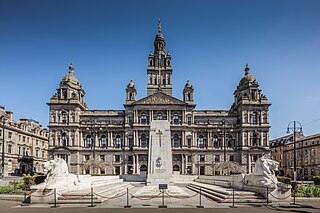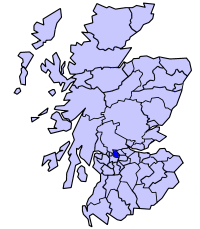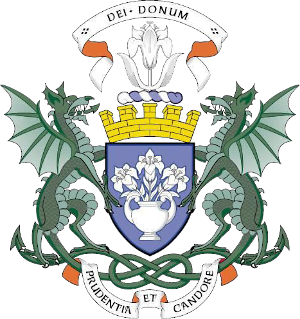
Aberdeen City Council is the local authority for Aberdeen City, one of the 32 council areas of Scotland. In its modern form it was created in 1996. Aberdeen was formerly governed by a corporation from when it was made a burgh in the twelfth century until 1975. Between 1975 and 1996 the city was governed by City of Aberdeen District Council, a lower-tier authority within the Grampian region.

Glasgow City Council is the local government authority for Glasgow City council area, Scotland. In its modern form it was created in 1996. Glasgow was formerly governed by a corporation, also known as the town council, from the granting of its first burgh charter in the 1170s until 1975. From 1975 until 1996 the city was governed by City of Glasgow District Council, a lower-tier authority within the Strathclyde region.

Falkirk is one of 32 unitary authority council areas of Scotland. It was formed on 1 April 1996 by way of the Local Government etc. (Scotland) Act 1994 from the exact boundaries of Falkirk District, one of three parts of the Central region created in 1975, which was abolished at that time. Prior to the 1975 reorganisation, the majority of the council area was part of the historic county of Stirlingshire, and a small part, namely Bo'ness and Blackness, was part of the former county of West Lothian.

Local government in Scotland comprises thirty-two local authorities, commonly referred to as councils. Each council provides public services, including education, social care, waste management, libraries and planning. Councils receive the majority of their funding from the Scottish Government, but operate independently and are accountable to their local electorates. Councils raise additional income via the Council Tax, a locally variable domestic property tax, and Business rates, a non-domestic property tax.
A councillor, alternatively councilman, councilwoman, councilperson, or council member, is someone who sits on, votes in, or is a member of, a council. This is typically an elected representative of an electoral district in a municipal or regional government, or other local authority. The title of a councillor varies geographically, with a name generally being preceded by their title in formal or council-related situations in many places.

A burgh is an autonomous municipal corporation in Scotland, usually a city, town, or toun in Scots. This type of administrative division existed from the 12th century, when King David I created the first royal burghs. Burgh status was broadly analogous to borough status, found in the rest of the United Kingdom. Following local government reorganisation in 1975, the title of "royal burgh" remains in use in many towns, but now has little more than ceremonial value.

The Local Government etc. (Scotland) Act 1994 is an Act of the Parliament of the United Kingdom that created the current local government structure of 32 unitary authorities covering the whole of Scotland.

Strathkelvin is the strath (valley) of the River Kelvin in west central Scotland, lying north-east of Glasgow. The name Strathkelvin was used between 1975 and 1996 for one of nineteen local government districts in the Strathclyde region.
A town council, city council or municipal council is a form of local government for small municipalities.
A county council is the elected administrative body governing an area known as a county. This term has slightly different meanings in different countries.

A lord provost is the convenor of the local authority, the civic head and the lord-lieutenant of one of the principal cities of Scotland. The office is similar to that of a lord mayor. Only the cities of Aberdeen, Dundee, Edinburgh and Glasgow have a lord provost; other Scottish local authorities have provosts or convenors, which are similar offices to that of a mayor. Perth previously termed its civil leader a "lord provost", but from the Second World War onwards has preferred the simple term Provost of Perth.
The local government areas of Scotland were redefined by the Local Government (Scotland) Act 1973 and redefined again by the Local Government etc (Scotland) Act 1994.
A community council is a public representative body in Great Britain.
A bailie or baillie is a civic officer in the local government of Scotland. The position arose in the burghs, where bailies formerly held a post similar to that of an alderman or magistrate. Baillies appointed the high constables in Edinburgh, Leith and Perth. Modern bailies exist in Scottish local councils, and the position being a courtesy title, appointees are often requested to provide support to the lord provost or provost - the ceremonial and civic head of the council - in their various engagements.
A police burgh was a Scottish burgh which had adopted a "police system" for governing the town. They existed from 1833 to 1975.
A prévôt was a governmental position of varying importance in Ancien Régime France, typically referring to a civil officer, magistrate, head of cathedral or church, often anglicised as provost. A unit of justice or court overseen by a prévôt was known as a prévôté.

Dundee City Council is the local authority for Dundee City, one of the 32 council areas of Scotland. In its modern form it was created in 1996. Dundee was formerly governed by a corporation from when it was made a burgh in the late twelfth century until 1975. Between 1975 and 1996 the city was governed by City of Dundee District Council, a lower-tier authority within the Tayside region.

West Lothian Council is the local authority for West Lothian, one of the 32 council areas of Scotland.

The City of Edinburgh Council is the local government authority covering the City of Edinburgh council area. Almost half of the council area is the built-up area of Edinburgh, capital of Scotland. With a population of 514,990 in mid-2019, it is the second most populous local authority area in Scotland.











